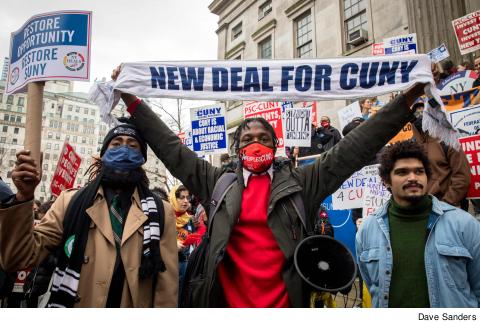Unions and students show their strength
 |
They came from as nearby as Park Slope, Brooklyn and as far north as Plattsburgh. They were from SUNY and CUNY – faculty, staff, students and alumni. There were state lawmakers from both houses. There were political and community groups, representing people from all around the city. On March 6, nearly 1,000 people joined the PSC and the union representing SUNY faculty and staff, United University Professions (UUP) for a rally, demanding that the state budget include full funding for CUNY and funding for the New Deal for CUNY (ND4C), which would fund the hiring of more full-time faculty and staff and make CUNY tuition-free.
The demonstrators rallied in Downtown Brooklyn, marched across the Brooklyn Bridge and gathered at Foley Square in Manhattan near New York City Hall. The event was perhaps the most visible part of a multipronged strategy to push for a transformative budget for public higher education in the state after decades of chronic underfunding. PSC President James Davis told the crowd that the final budget should go beyond what the CUNY Board of Trustees asked for. “We need a transformative investment,” he said.
More than 70 state lawmakers have signaled support for the ND4C. The governor’s Executive Budget and the New York State Legislature’s counterproposal both offer increases to public higher education. Both are good signs that Governor Kathy Hochul’s administration is committed to reversing the years of brutal austerity imposed by her predecessor, Andrew Cuomo.
A PROMISING BUDGET
In March, the union’s position in the state budget fight was looking bright. Politico New York reported that the “senate’s plans call for the implementation of a ‘New Deal’ funding program for public colleges” that would “give CUNY an additional $500 million and SUNY an additional $600 million,” including “$153 million earmarked for the hiring of new staff.” And, as our union previously reported, the governor’s proposal included a “combined $1.5 billion increase in operating support for CUNY and SUNY over the next five years, including an additional $170 million for CUNY senior colleges next year.”
As this newspaper went to press at the end of March, PSC members and principal officers were in Albany, attending a whirlwind of events, including demonstrations, lobbying efforts, press conferences and outreach to ensure that the ND4C would be funded in the state budget on April 1. Nothing was certain in Albany at the time, but the union’s leadership was hopeful about one thing: state funding for public higher education seemed on track to receive a significant boost, the result of extensive organizing and steady political pressure by PSC members.
In the first few months of 2022, PSC activists attended countless meetings with lawmakers, spoke to the media at press conferences in the city and in Albany, testified before state legislators and participated in other forms of outreach.
The PSC has helped build an extraordinary coalition, which includes student groups and other anti-austerity, pro-education activists. In the middle of March, more than 130 faith leaders from around the state and from many different religious backgrounds signed a letter calling on the state to put an additional $1 billion for SUNY and CUNY in this year’s budget.
“We must make higher education accessible to all in this state, and that means ensuring our SUNY and CUNY institutions have enough faculty, enough support staff and can again be tuition free, so that students do not have to weigh getting a degree against taking on years or decades of debt,” said Imam Shahid Farooqi, president of the Islamic Cirecle of North America Council for Social Justice in Nassau County.
The ND4C enjoys wide support in both chambers of the State Legislature, and the New York City Council passed a resolution in support of the state bill. Karines Reyes, a coauthor of the ND4C bill before the State Assembly and a CUNY graduate, told the crowd on March 6 that the bill has faced no opposition – a rarity in Albany politics. She said that there was a clear reason for this. “Everyone in the state and in the city benefits from a strong public higher education system,” said Reyes.
State Senator Jabari Brisport, who represents parts of Brooklyn, told the crowd, “If we need to tax the rich, we will do that.”
NEXT CONTRACT CAMPAIGN
PSC leaders have noted that while the governor’s budget proposal is ambitious in terms of ensuring the hiring of more full-time faculty at CUNY, the university still must hire more full-time mental health counselors and other advisors. PSC leaders believe that the state must deliver on that aspect of the bill, and it must also make the university free for its undergraduate students, as it once was.
All of this organizing is part of a broader campaign leading up to the next contract fight. The current union contract with CUNY expires next spring. The PSC hopes to build upon the economic victories made in the last contract campaign, where the union won across-the-board raises as well as significant gains for adjuncts.
But in order to win economic gains in the next contract, the union and its allies must address the chronic underfunding of CUNY. Increased funding in this state budget is a part of the campaign. The next part is securing increased funding for community colleges in the city budget in June. And it also means passing the New Deal for CUNY.

